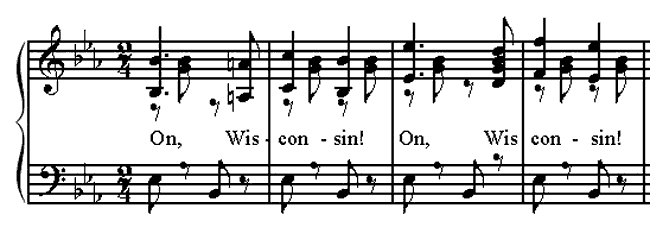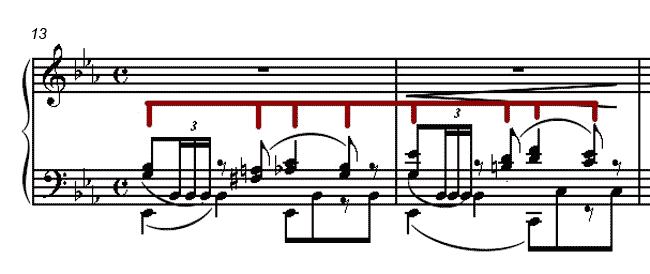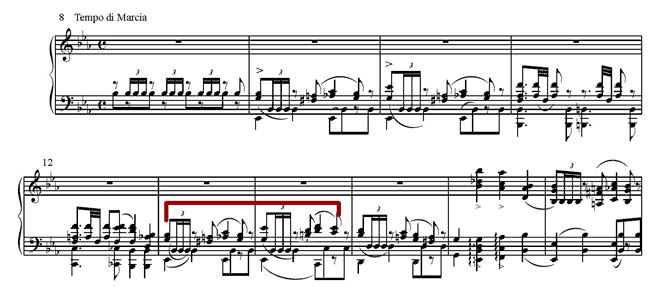
In poring through the scores I had collected of Pieczonka’s music, I was astonished when I played his Grand Marche Triomphale—published in 1880.1 The main theme of this piece seemed to be an exact replica of the primary motive of On, Wisconsin, the classic American football fight song, written in the early 1900s. Is it possible that Pieczonka’s theme had inspired On, Wisconsin? I knew that a definitive answer to that question would be hard, if not impossible, to find. Fortunately there is a lot of detailed history available because of the fight song’s enduring fame. On, Wisconsin was written in 1909 by William Purdy, a struggling musician working in Chicago as a clerk, with lyrics by Carl Beck, a part-time University of Wisconsin student. Fate provided that both men were living in the same Chicago rooming house at the same time. According to the written accounts passed down by Beck and compiled in 1937 by Louise Phelps Kellogg in the Wisconsin Magazine of History,2 Purdy was competing to win a $100 prize by composing a new gridiron fight song for the University of Minnesota. "Purdy had been struggling for some time with the strains of a march that kept running through his head. One night he went down to the parlor of the boarding house and began trying over on the piano the theme that he had in mind. Beck heard him and immediately called out, “What’s that? It is good!” “Oh”, replied Purdy,” I am trying to swing a football song in shape for Minnesota university. Don’t you hear the beat of the words, ‘Min-ne-so-ta, Min-ne-so-ta?’” “No! Bill, it’s ‘On, Wisconsin, On, Wisconsin’ that it says to me,” cried Beck excitedly. “You go on with that music, I will write the words.” With trial and error the two young men worked hard on their project, and before the night was old the song On, Wisconsin had been born."3 The march was then dedicated and presented to the University of Wisconsin, not Minnesota; the $100 prize was not destined to be Purdy’s. Let’s look at these themes closely: As indicated in Beck’s account, the most distinctive theme in Purdy’s On, Wisconsin march is the opening motive, with its lively, rhythmic connection to the words, “On,Wis-con-sin.” On, Wisconsin first edition (1909, original key G Major)
Now compare it to the opening theme of Pieczonka’s Grande Marche Triomphale, more specifically to the extension of the theme in its second statement: Grande Marche Triomphale (1880) This longer extract from the Grande Marche Triomphale shows the pervasive repetition of the motive in the Pieczonka original. Grande Marche Triomphale (1880)
In comparing Purdy’s and Pieczonka’s examples, the parallel characteristics are striking: identical melodic lines and rhythm, same march tempo; the bass lines are even similar and both share a simple meter. Did Purdy copy Pieczonka’s Grand Marche Triomphale? We will never know with certainty. But the research shows it was quite possible. Chicago has long been noted for its very large Polish community—sometimes called Polonia. 1909 was close to the end of a large wave of Polish immigration to Chicago. Were Purdy and Beck living in the Polish community at the time? We know from Beck’s account that there was a piano in the boarding house. The “piano in the parlor” tradition was widespread at this time. If you wanted music on demand, you had to play it—and sheet music was ubiquitous. Of Polish origin, the surname Pieczonka would certainly have been attractive to members of this Polish community (and the extended community) when shopping for sheet music or rolls for player pianos. By 1909 Albert Pieczonka was already a very popular composer in America. His Tarantella in A Minor was well known and its popularity was documented as early as 1902 in the national magazine, The Etude.4 (Albert was also well known for his Polish Chivalry and Dancing Waves.) His compositional style—pianistically rewarding with minimal technical demands—made his works quite marketable and widely distributed throughout the United States. Combining the factors of local Polish culture with Pieczonka’s national reputation, there is a good chance that Albert’s Grande Marche Triomphale had made its way to the pianos of Polonia—indeed the whole city of Chicago—by 1909. Did Purdy hear it or see the music? The incredible similarities between the two themes appear to narrow the possibilities to probabilities. “Creative borrowing” of themes is common practice in music. Just about all composers have done it consciously or unconsciously at some point in their careers. The incredible contrast between Pieczonka’s deep obscurity and the immeasurable and lasting fame of On, Wisconsin surely heightens the Purdy-Pieczonka connection, however. Ironically during all the years that we were hunting for Albert’s “lost” music—it may already have been heard on the football fields of America, loved and appreciated by hundreds of thousands of sports fans. In the June,1880 edition of the British music journal, The Monthly Musical Record, I recently discovered a review of Pieczonka’s newly composed Grande Marche Triomphale, which is stunning in its prophesy: “REGARDED as a march alone, the composition now before us is worthy of some consideration. It is spirited, bold, dashing, and fiery, with the rhythm well marked and kept up, and a swing in the melody which is absolutely necessary as a primary ingredient towards success. … Of all the satisfaction I have derived from uncovering the details of Albert’s life, the probability that his music lived on, not just through the Tarantella but in the mass market, has been particularly gratifying. I am sure that Albert would have been proud to make such a contribution to the traditions of his new homeland. Post Scriptum After Purdy and Beck scraped together some funds to self-publish On, Wisconsin, the song was an immediate hit. Purdy never made much money from the song however. His financial hardships continued because he was never successful publishing his other compositions.6 It is said that he sold the rights to On, Wisconsin for less than $100 in 1917 and died of tuberculosis the next year, bankrupt. John Philip Sousa reportedly called On, Wisconsin the best of the college fight songs. In 1959, it officially became Wisconsin’s state song.
Copyright © Stephen Erickson. All Rights Reserved June 12, 2008 1. As with most of Pieczonka’s works, the exact year of composition is not known—to date the earliest edition is dated 1880. 2. Kellogg, Louise Phelps. (1937, September). ‘On, Wisconsin’—The Football Song. The Wisconsin Magazine of History, 21 (1) 3. Kellogg, pp. 35-36 4. In 1915, The Etude also printed his Polish Chivalry and references to the immense popularity of Albert’s works would appear in educational texts. 5. The Monthly Musical Record (June 1, 1880), London: Augener, page 82. 6. Dictionary of Wisconsin Biography (1960), Wisconsin Historical Society, p. 293. |


